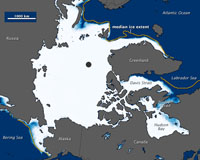| . |  |
. |
Kingston, Canada (SPX) May 18, 2011 Scientists from Queen's and Carleton universities head a national multidisciplinary research team that has uncovered startling new evidence of the destructive impact of global climate change on North America's largest Arctic delta. "One of the most ominous threats of global warming today is from rising sea levels, which can cause marine waters to inundate the land," says the team's co-leader, Queen's graduate student Joshua Thienpont. "The threat is especially acute in polar regions, where shrinking sea ice increases the risk of storm surges." By studying growth rings from coastal shrubs and lake sediments in the Mackenzie Delta region of the Northwest Territories - the scene of a widespread and ecologically destructive storm surge in 1999 - the researchers have discovered that the impact of these salt-water surges is unprecedented in the 1,000-year history of the lake. "This had been predicted by all the models and now we have empirical evidence," says team co-leader Michael Pisaric, a geography professor at Carleton. The Inuvialuit, who live in the northwest Arctic, identified that a major surge had occurred in 1999, and assisted with field work. The researchers studied the impact of salt water flooding on alder bushes along the coastline. More than half of the shrubs sampled were dead within a year of the 1999 surge, while an additional 37 per cent died within five years. A decade after the flood, the soils still contained high concentrations of salt. In addition, sediment core profiles from inland lakes revealed dramatic changes in the aquatic life - with a striking shift from fresh to salt-water species following the storm surge. "Our findings show this is ecologically unprecedented over the last millennium," says Queen's biology professor and team member John Smol, Canada Research Chair in Environmental Change and winner of the 2004 NSERC Herzberg Gold Medal as Canada's top scientist. "The Arctic is on the front line of climate change. It's a bellwether of things to come: what affects the Arctic eventually will affect us all." Since nearly all Arctic indigenous communities are coastal, the damage from future surges could also have significant social impacts. The team predicts that sea ice cover, sea levels and the frequency and intensity of storms and marine storm surges will become more variable in the 21st century. Other members of the team include Trevor Lantz from the University of Victoria, Steven Kokelj from Indian and Northern Affairs Canada, Steven Solomon from the Geological Survey of Canada and Queen's undergraduate student Holly Nesbitt. Their findings are published in the prestigious international journal Proceedings of the National Academy of Sciences.
Share This Article With Planet Earth
Related Links Queen's University Beyond the Ice Age
 Denmark plans claim to North Pole seabed: foreign minister
Denmark plans claim to North Pole seabed: foreign ministerCopenhagen (AFP) May 17, 2011 Denmark which already counts Greenland and the Faroe Islands as its Arctic territories is planning to lay claim to the North Pole sea bed, Foreign Minister Lene Espersen said in a statement Tuesday. "We expect that Denmark will be able to document claims to an area that among other things includes the sea bed at the North Pole," Espersen said in a statement, stressing however that "the North ... read more |
|
| The content herein, unless otherwise known to be public domain, are Copyright 1995-2010 - SpaceDaily. AFP and UPI Wire Stories are copyright Agence France-Presse and United Press International. ESA Portal Reports are copyright European Space Agency. All NASA sourced material is public domain. Additional copyrights may apply in whole or part to other bona fide parties. Advertising does not imply endorsement,agreement or approval of any opinions, statements or information provided by SpaceDaily on any Web page published or hosted by SpaceDaily. Privacy Statement |